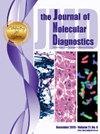Pharmacogenetic Testing in Admixed Populations
IF 3.4
3区 医学
Q1 PATHOLOGY
引用次数: 0
Abstract
This article examines the frequency distribution of tier 1 pharmacogenetic variants of the Association for Molecular Pathology Pharmacogenomics Working Group Recommendations in two large (>1000 individuals) cohorts of the admixed Brazilian population, and in patients from the Brazilian Public Health System enrolled in pharmacogenetic trials. Three tier 1 variants, all in DPYD, were consistently absent, which may justify their noninclusion in genotyping panels for Brazilians; 13 variants had frequency ≤1.0%, and the remaining 21 variants ranged in frequency from 1.2% (NUDT15∗3) to 76.4% (CYP3A5∗3). The frequency of some CYP2C9, CYP2D6, CYP3A4, and VKORC1 variants differed significantly across the three major race/color categories of the Brazilian Census (White, Brown, and Black), as a consequence of different proportions of individual European and African ancestry. However, it is recommended that selection of variants for inclusion in pharmacogenetic testing panels and implementation of pharmacogenetic-informed dosing guidelines for Brazilians should not be determined by race/color categories. Native Americans (0.4% of the Brazilian population), virtually absent from the study cohorts, display wide interethnic diversity in frequency of some tier 1 variants (eg, NUDT15∗3 and TPMT∗3A) and/or differ markedly from non-Indigenous people in frequency of some variant alleles (eg, CYP2C19∗17). Collectively, the data support the notion that population diversity must be taken into account on the design and implementation of pharmacogenetic testing panels.
混合人群的药物遗传学检测:巴西人AMR PGx工作组1级变异等位基因的频率。
本文研究了分子病理学药物基因组学工作组推荐的第1级药物遗传变异在巴西混合人群的两个大型(1000人)队列中的频率分布,以及在巴西公共卫生系统中参加药物遗传试验的患者中。三种1级变异(均为DPYD)一直不存在,这可能是不将其纳入巴西人基因分型小组的原因;13个变异的频率< 1.0%,其余21个变异的频率从1.2% (NUDT15*3)到76.4% (CYP3A5*3)不等。一些CYP2C9, CYP2D6, CYP3A4和VKORC1变异的频率在巴西人口普查的三个主要“种族/颜色”类别(白色,棕色和黑色)中存在显著差异,这是欧洲和非洲血统个体比例不同的结果。然而,建议不应根据种族/肤色类别来选择纳入药物遗传学检测小组的变异和实施针对巴西人的药物遗传学知情给药指南。印第安人(占巴西人口的0.4%)几乎没有出现在研究队列中,他们在一些一级变异(如NUDT15*3和TPMT*3A)的频率上显示出广泛的种族间差异,并且/或者在一些变异等位基因(如CYP2C19*17)的频率上与非土著人群有显著差异。总的来说,这些数据支持这样一种观点,即在设计和实施药物遗传学测试小组时必须考虑人口多样性。
本文章由计算机程序翻译,如有差异,请以英文原文为准。
求助全文
约1分钟内获得全文
求助全文
来源期刊
CiteScore
8.10
自引率
2.40%
发文量
143
审稿时长
43 days
期刊介绍:
The Journal of Molecular Diagnostics, the official publication of the Association for Molecular Pathology (AMP), co-owned by the American Society for Investigative Pathology (ASIP), seeks to publish high quality original papers on scientific advances in the translation and validation of molecular discoveries in medicine into the clinical diagnostic setting, and the description and application of technological advances in the field of molecular diagnostic medicine. The editors welcome for review articles that contain: novel discoveries or clinicopathologic correlations including studies in oncology, infectious diseases, inherited diseases, predisposition to disease, clinical informatics, or the description of polymorphisms linked to disease states or normal variations; the application of diagnostic methodologies in clinical trials; or the development of new or improved molecular methods which may be applied to diagnosis or monitoring of disease or disease predisposition.

 求助内容:
求助内容: 应助结果提醒方式:
应助结果提醒方式:


